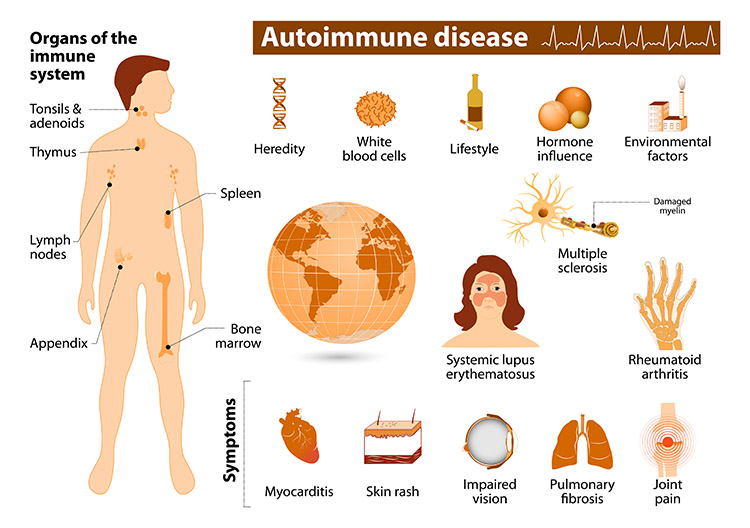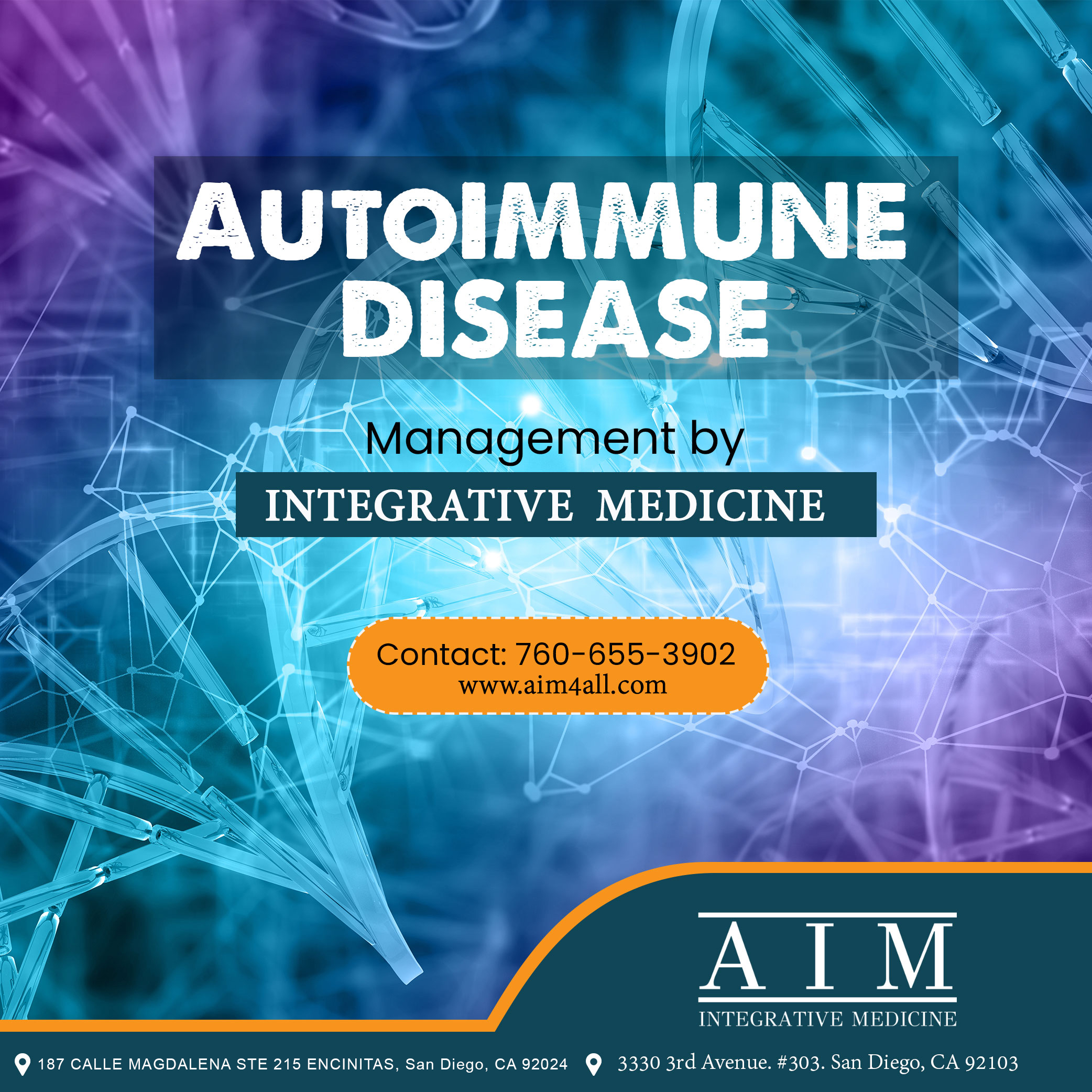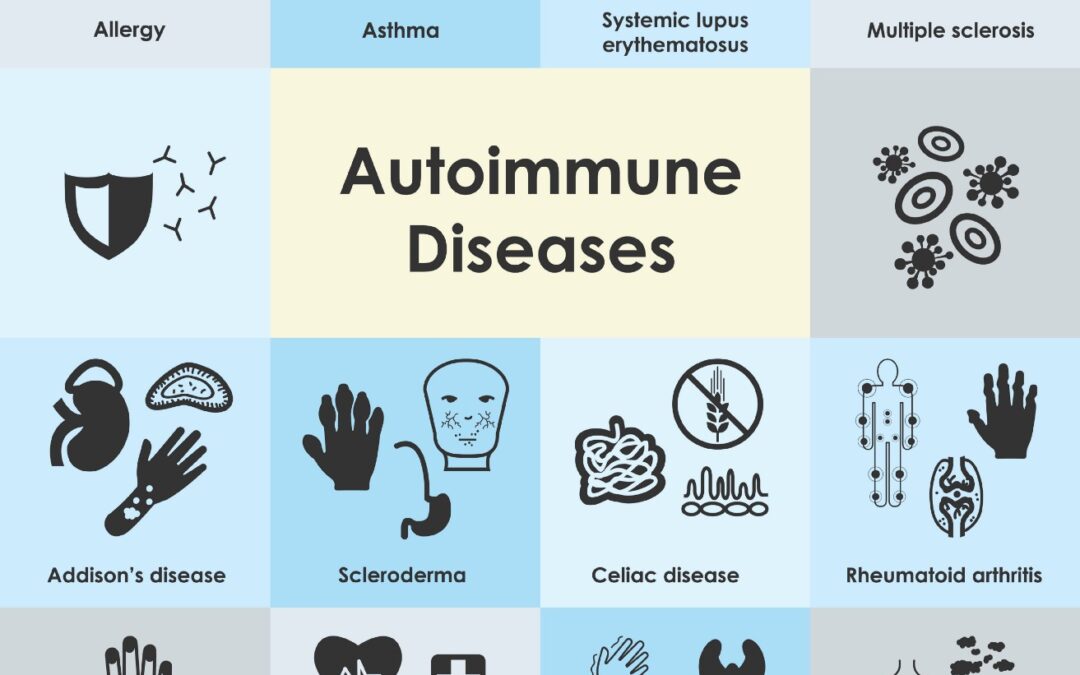A healthy immune system defends the body against disease and infection. But if the immune system malfunctions, it mistakenly attacks healthy cells, tissues, and organs. Called autoimmune disease, these attacks can affect any part of the body, weakening bodily function and even turning life-threatening.
Scientists know about more than 80 autoimmune diseases. Some are well-known, such as type 1 diabetes, multiple sclerosis, lupus, and rheumatoid arthritis, while others are rare and difficult to diagnose. With unusual autoimmune diseases, patients may suffer years before getting a proper diagnosis. Most of these diseases have no cure. Some require lifelong treatment to ease symptoms.
Integrative Autoimmune Disorders Care
You may be struggling with an autoimmune disorder and not even know it. If you’ve got persistent, nonspecific symptoms like pain, fatigue and fever, consult with a holistic and integrative doctor in the AIM Integrative Medicine. We can help identify causes and treatments—and we won’t tell you it’s all in your head.
Collectively, these diseases affect more than 24 million people in the United States. An additional eight million people have auto-antibodies, blood molecules that indicate a person’s chance of developing autoimmune disease. Autoimmune diseases are affecting more people for reasons unknown. Likewise, the causes of these diseases remain a mystery.

Integrative Medicine Approach for Autoimmune Diseases
Maybe you’ve consulted with doctor after doctor before getting a diagnosis—or, you’ve been told there’s nothing you can do. You may be exhausted, stressed, confused and in pain, and you’re not sure what to try next.
Autoimmune disorders represent some of today’s most vexing diseases. Though not immediately life-threatening, these serious and real conditions—in which your own immune system works against you by attacking healthy cells—wreak havoc on everyday life, causing symptoms that include fatigue, fever, joint or muscle pain, and other inflammatory responses. They’re the second most common cause of chronic illness in America.
Medical experts still don’t know exactly what causes autoimmune diseases. At AIM Integrative Medicine, specialists can help pinpoint your condition and relieve its effects on your life through holistic and integrative practices—including nutritional assessments, functional medicine workups, and traditional healing therapies like acupuncture and homeopathy.
Why choose Dr, Hetal Patel for autoimmune conditions treatment?
At AIM – Integrative Medicine we provide specialized expertise on autoimmune conditions including:
- Celiac disease
- Crohn’s disease
- Graves disease
- Hashimoto syndrome
- Post-Lyme disease syndrome
- Lupus
- Multiple sclerosis
- Psoriasis
- Rheumatoid arthritis
- Type 1 diabetes
During your integrative physician assessment, we’ll listen to your story. Then, carefully and over time, we’ll help you choose the best possible treatment plan to restore health and balance to your body’s physical, mental and emotional systems.
How does the integrative medicine approach work toward Autoimmunity diseases?
Integrative Medicine is an approach to healthcare that combines conventional medicine with evidence-based complementary therapies to address the whole person – mind, body, and spirit. Integrative Medicine can be a useful tool in the management of autoimmune diseases, which are conditions in which the immune system attacks healthy cells in the body.
Here are some ways that Integrative Medicine help manage autoimmune diseases:
- Nutrition: Nutrition is an important component of managing autoimmune diseases. An Integrative Medicine practitioner can help create an individualized nutrition plan that emphasizes whole, nutrient-dense foods and limits inflammatory foods like sugar, processed foods, and alcohol.
- Stress management: Stress can exacerbate autoimmune disease symptoms. Integrative Medicine offers a variety of stress-reducing techniques, such as mindfulness meditation, yoga, and acupuncture, to help manage stress.
- Exercise: Exercise can help improve symptoms of autoimmune diseases and boost overall health. An Integrative Medicine practitioner can help create a safe and effective exercise plan that takes into account an individual’s unique needs and limitations.
- Supplementation: Certain supplements, such as omega-3 fatty acids, vitamin D, and probiotics, have been shown to have anti-inflammatory effects and may help manage autoimmune disease symptoms. An Integrative Medicine practitioner can recommend appropriate supplements based on an individual’s specific needs.
- Mind-body therapies: Mind-body therapies, such as hypnotherapy, guided imagery, and biofeedback, can help manage autoimmune disease symptoms by reducing stress and improving overall well-being.

Frequently Asked Questions About Autoimmune Disorders
Which doctors treat Autoimmune Disorders?
An Integrative Medicine specialist handles all types of cases.
Can a person affected with one Autoimmune Disease suffer from another?
an Autoimmune Disorders result in death?
What are some hidden facts about autoimmune diseases?
Are autoimmune diseases hard to cure?
Who suffers more from autoimmune disease?
What triggers autoimmune diseases?
- Some medications
- Having relatives with autoimmune diseases
- Smoking
- Already having one autoimmune disease
- Exposure to toxins
- Being female — 78% of people who have an autoimmune disease are women
- Obesity
- Infections
Can you live a normal life with autoimmune diseases?
Are autoimmune diseases genetic?
Are all autoimmune diseases lifelong?
Do hormones affect autoimmune disease?
Can stress cause autoimmune disease?
What 2 things are responsible for autoimmune disease?
Can autoimmune be transmitted?
What causes autoimmune diseases? No one is sure why autoimmune diseases happen. But you can’t catch them from other people. Autoimmune diseases do tend to run in families, which means that certain genes may make some people more likely to develop a problem.
Can autoimmune disease be passed to the baby?
Does autoimmune affect mood?
Is autoimmune disease related to mental health?
How do autoimmune attacks start?
Are autoimmune diseases cancerous?
Can pregnancy cure autoimmune disease?
What is a holistic approach to treating autoimmune disease?
As part of your holistic care treatment plan, we could recommend a variety of strategies, such as:
- An anti-inflammatory diet centered around whole foods
- Regular exercise
- Relaxation and stress management techniques, like yoga, deep breathing, and meditation
- IV nutrition therapy to address vitamin deficiencies and dehydration
- Osteopathic manipulative therapy to improve bone and joint alignment
- Bowen therapy to stretch fascia, a type of connective tissue
- Acupuncture or massage
We also work with you to restore sleep quality, an essential component for health and wellness that can help decrease inflammation.
Taking a whole-body approach to managing your autoimmune disease can feel overwhelming. However, with our support and guidance, you can enjoy the benefits of these drug-free, noninvasive solutions that provide much better results with less risk than conventional treatments and no downtime.
Integrative Medicine Options for Treating Autoimmune Disease Naturally
Address Gut Microbiome
Triggers may include sugar, wheat, processed foods, dairy, and gluten. Among other intolerances one may have. Repairing the gut with amino acids such as L-Glutamine may be recommended.
The 5 R Protocol may also be recommended depending on individual needs. This diet consists of removing what is disruptive to the gut. Replacing with digestive enzymes, HCL, or bile that one may be deficient in. Reinoculating with probiotic-rich food sources and nutrient-dense foods. And finally, repairing the gut lining with supportive nutrients such as glutamine.
Rule Out Food Allergies and Sensitivities
Food allergies and sensitivities can impede upon the integrity of the gut lining and lead to systemic inflammation, gut microbiome imbalances, and malabsorption—- and contribute to autoimmune conditions.
Manage and Reduce Stress
High levels of chronic stress can cause imbalances in the immune system and the gut microbiome. Stress can reduce stomach acid in the gut, impede microbial diversity and composition, and contribute to intestinal permeability or leaky gut. Moreover, repeated stress can cause inflammation and wreak havoc on immunity.
Reduce Toxin Exposure
Toxic exposure from the environment can cause oxidative stress and inflammation in the body and wreak havoc on immunity. You can reduce exposure to environmental toxins by using an air and water filter, fragrance-free and natural household cleaners, and switching from plastic to glass storage containers.
Rule out Infections
Infections occur when viruses, bacteria, or other microbes enter the body and multiply. The body’s response to infection often results in redness, inflammation, and fever. Infections can trigger autoimmune disease, especially for those with genetic predispositions. If you suspect you have an infection, it’s important to seek medical attention to rule this possible cause out.
Autoimmune Disease Diet
A significant body of research indicates that plant-based, anti-inflammatory, and whole foods diets may support autoimmune disease.
Research suggests that nutritional approaches with characteristics of both a Mediterranean diet and one rich in whole foods and unprocessed meats have effectively supported autoimmune conditions.

Recent Comments